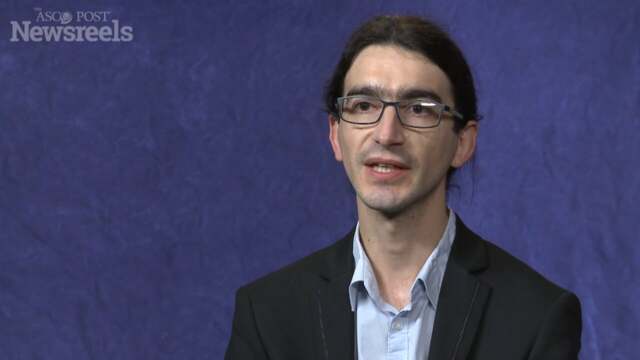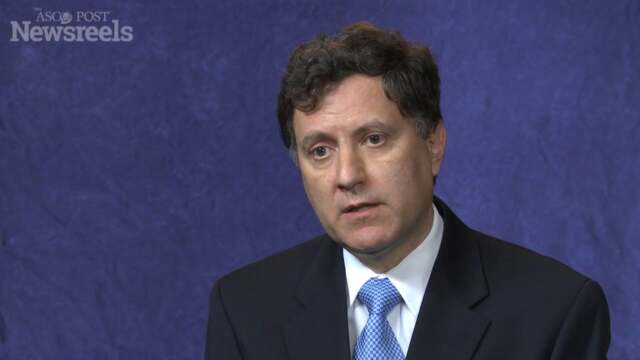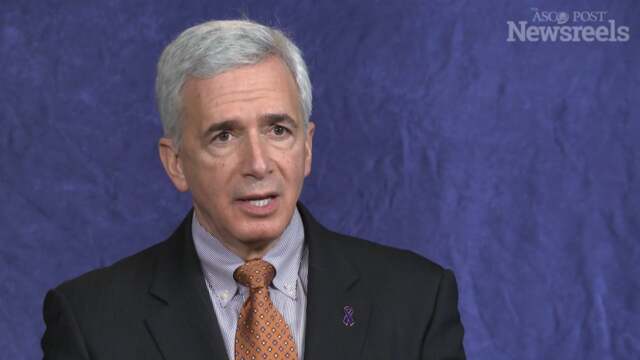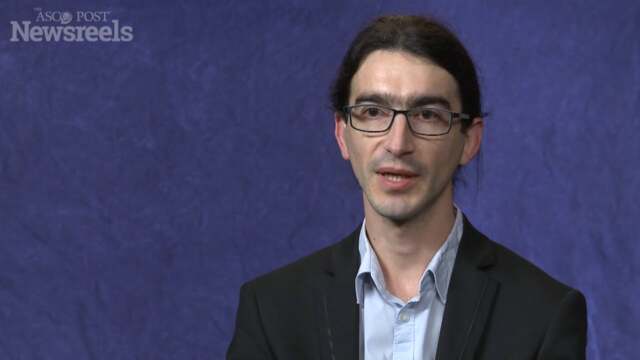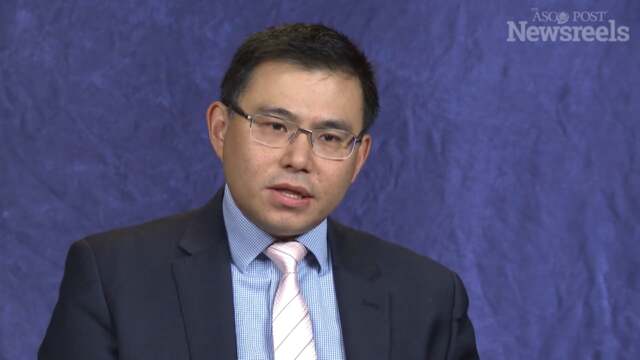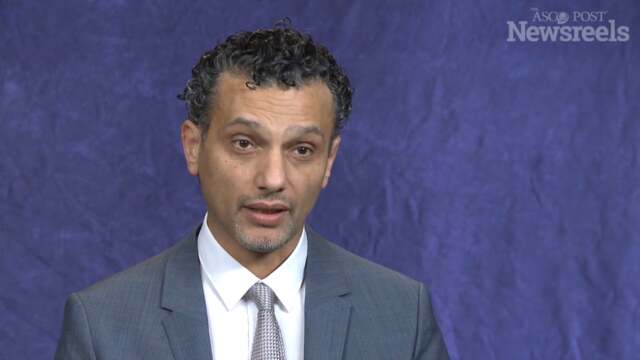2017 Gastrointestinal Cancers Symposium
Expert Point of View: Manish A. Shah, MD
Manish A. Shah, MD, Director of Gastrointestinal Oncology at NewYorkPresbyterian and Weill Cornell Medicine, commented that “the benefit seen in patients who regularly exercise is equal to or better ...
Moderate Activity May Improve Overall and Progression-Free Survival in Patients With Metastatic Colorectal Cancer
Patients with metastatic colon cancer who exercise may live longer, according to an analysis of the CALGB/SWOG 80405 trial presented at the 2017 Gastrointestinal Cancers Symposium.1 According to the a...
Expert Point of View: Nancy Baxter, MD, PhD & Steven H. Lin, MD, PhD
“CALGB 80803 really helps move the field forward,” said press briefing moderator and ASCO spokesperson Nancy Baxter, MD, PhD, a surgeon from St. Michael’s Hospital in Toronto, Ontario, Canada. “PET [...
Early PET Imaging May Guide Treatment Decisions in Esophageal Cancer
In patients with resectable esophageal or gastroesophageal junction cancer, positron-emission tomography (PET) imaging was used to assess response to induction chemotherapy. PET nonresponders were ide...
Expert Point of View: Milind Javle, MD
Milind Javle, MD, Professor of Gastrointestinal Oncology at The University of Texas MD Anderson Cancer Center, Houston, discussed the findings from the CheckMate 040 trial presented at the 2017 Gastr...
Nivolumab Shows Benefit in Advanced Hepatocellular Carcinoma
In patients with advanced hepatocellular carcinoma, treatment with nivolumab (Opdivo) resulted in responses and long-term survival in patients who were either previously treated or naive to sorafenib ...
Update on Overall Survival for Newly Diagnosed Patients With Metastatic Pancreatic Cancer
Although “treatment advances” and “precision medicine” are today’s buzz words in oncology, they don’t apply equally to all malignancies. For instance, median overall survival for newly diagnosed patie...
Expert Point of View: Vincent J. Picozzi, MD
Vincent J. Picozzi, MD, a pancreatic cancer specialist at Virginia Mason Hospital in Seattle, commented on the findings by Chan et al presented at the 2017 Gastrointestinal Cancers Symposium. Dr. Pic...
Cabozantinib Elicits Responses in Neuroendocrine and Carcinoid Tumors
In a phase II study reported at the 2017 Gastrointestinal Cancers Symposium, the tyrosine kinase inhibitor cabozantinib (Cometriq) was evaluated in advanced carcinoid and pancreatic neuroendocrine tu...
Expert Point of View: Ghassan K. Abou-Alfa, MD
Ghassan K. Abou-Alfa, MD, a liver and biliary cancer specialist at Memorial Sloan Kettering Cancer Center, New York, commented on the study for The ASCO Post. While acknowledging that a single-instit...
Novel Bridge to Liver Transplant May Improve Upon Standard of Care
For hepatocellular carcinoma patients awaiting a liver transplant, locoregional treatment as a “bridge” is a standard strategy for reducing tumor progression. The most common approach is transarterial...
Expert Point of View: Philip B. Paty, MD
Philip B. Paty, MD, a surgical oncologist at Memorial Sloan Kettering Cancer Center, New York, commented on the findings for The ASCO Post. Dr. Paty is leading studies of surveillance at his own inst...
‘Watch-and-Wait’ Strategy Does Not Compromise Survival in Selected Patients With Rectal Cancer
A “watch-and-wait” approach to treating rectal cancer patients with complete responses to chemoradiotherapy resulted in a 3-year survival rate of 91%, which is similar to historic survival rates afte...
Expert Point of View: Frank Sinicrope, MD
Frank Sinicrope, MD, Professor of Medicine and Oncology at the Mayo Clinic, Rochester, Minnesota, told The ASCO Post that anti–programmed cell death protein 1 (anti–PD-1) agents “have already changed...
CheckMate 142 Update: Prolonged Disease Control With Nivolumab in Deficient Mismatch Repair Colorectal Cancer
With 6 additional months of follow-up since the initial presentation of results, in the phase II CheckMate 142 trial, 74% of heavily pretreated patients with metastatic colorectal microsatellite insta...
Expert Point of View: Heinz-Josef Lenz, MD
Heinz-Josef Lenz, MD, of the University of Southern California in Los Angeles, said the results of the ONO-4538 trial were impressive in light of this challenging patient population. “You see a signi...
Nivolumab, as Salvage, Improves Overall Survival in Gastric Cancer
Gastric cancer can apparently be added to the growing list of malignancies for which drugs targeting the programmed cell death protein 1 (PD‑1) receptor are effective, according to the results of the...
Expert Point of View: Frank A. Sinicrope, MD
Frank A. Sinicrope, MD, Professor of Medicine and Oncology at the Mayo Clinic, Rochester, Minnesota, told The ASCO Post that the regimen of irinotecan/cetuximab (Erbitux)/vemurafenib (Zelboraf) coul...
Dual Inhibition Proves Effective for BRAF-Mutated Colorectal Tumors
In patients with metastatic colorectal cancer who have mutations in BRAF V600, the addition of the BRAF inhibitor vemurafenib (Zelboraf) to cetuximab (Erbitux) and irinotecan significantly improved p...
Ignacio Melero, MD, PhD, on Hepatocellular Carcinoma: Results of the CheckMate 040 Trial (Spanish Language Version) 
Ignacio Melero, MD, PhD, of the University Clinic of Navarra, Centre of Applied Medical Research, discusses in Spanish study findings on nivolumab dose escalation and expansion in patients with advanc...
Julien Edeline, MD, on Biliary Tract Cancer: Results of the PRODIGY 12-ACCORD 18 Trial (French Language Version) 
Julien Edeline, MD, of the Centre Eugène Marquis, discusses in French study findings on gemcitabine and oxaliplatin vs surveillance following surgery for localized biliary tract cancer (Abstract 225).
Cynthia L. Sears, MD, on Colon Cancer: Keynote Lecture
Cynthia L. Sears, MD, of Johns Hopkins University School of Medicine, summarizes her keynote talk on microbes, microbiota, and colon cancer. Next-generation sequencing combined with biologic studies s...
Sarah E. Hoffe, MD, on Pancreatic Cancer and SBRT: Pros and Cons
Sarah E. Hoffe, MD, of the Moffitt Cancer Center, discusses the controversial role of radiation in the treatment of pancreatic cancer, recent advances in delivering short courses of high-dose stereota...
Masanori Terashima, MD, PhD, on Gastric Cancer: Results of the JCOG1001 Trial
Masanori Terashima, MD, PhD, of Shizuoka Cancer Center, discusses phase III study findings evaluating bursectomy for patients with subserosal/serosal gastric cancer (Abstract 5).
Brendan J. Guercio, MD, on Colorectal Cancer and Physical Activity: Impact on Survival
Brendan J. Guercio, MD, of the Dana-Farber Cancer Institute, discusses results from a study of patients with metastatic colorectal cancer who took part in weekly physical activity and its impact on th...
Cornelis van de Velde, MD, PhD, on Rectal Cancer: A Database Update
Cornelis van de Velde, MD, PhD, of Leiden University Medical Center, discusses the International Watch & Wait database, established to track evidence on organ-preserving strategies in patients wit...
Eileen M. O’Reilly, MD, on Pancreatic and Hepatobiliary Cancers: Selecting High-Impact Targets
Eileen M. O’Reilly, MD, of Memorial Sloan Kettering Cancer Center, discusses a range of topics, including tyrosine kinase inhibitors, immune therapies, targeted approaches, and DNA damage repair strat...
Ignacio Melero, MD, PhD, on Hepatocellular Carcinoma: Results of the CheckMate 040 Trial
Ignacio Melero, MD, PhD, of the University Clinic of Navarra, Centre of Applied Medical Research, discusses study findings on nivolumab dose escalation and expansion in patients with advanced hepatoce...
Mark Talamonti, MD, on Pancreatic Cancer: Minimally Invasive Resection
Mark Talamonti, MD, of NorthShore University Health System, discusses the technical prerequisites for minimally invasive surgery in pancreatic cancers and the potential benefits to patients.
Michael J. Overman, MD, on Colorectal Cancer: Updated Results From CheckMate 142
Michael J. Overman, MD, of The University of Texas MD Anderson Cancer Center, discusses study findings on nivolumab alone or in combination with ipilimumab in patients with DNA mismatch repair–deficie...
Cathy Eng, MD, on Anal Squamous Cell Cancer: Management Strategies
Cathy Eng, MD, of The University of Texas MD Anderson Cancer Center, discusses management approaches to anal cancer, including the current standard of care, as well as novel approaches for locally adv...
Scott Kopetz, MD, on Colorectal Cancer: Results of the SWOG 1406 Trial
Scott Kopetz, MD, of The University of Texas MD Anderson Cancer Center, discusses study findings on irinotecan and cetuximab with or without vemurafenib in BRAF-mutant metastatic colorectal cancer (Ab...
Julien Edeline, MD, on Biliary Tract Cancer: Results of the PRODIGY 12-ACCORD 18 Trial
Julien Edeline, MD, of the Centre Eugène Marquis, discusses study findings on gemcitabine and oxaliplatin vs surveillance following surgery for localized biliary tract cancer (Abstract 225).
Ian Chau, MD, on Esophageal and Gastric Cancers: Systemic Agents and Options
Ian Chau, MD, of the Royal Marsden Hospital, discusses the continuum of care in esophageal and gastric cancers and the multiple active lines of treatment. Routine adoption of genomic testing may lead ...
Salah-Eddin Al-Batran, MD, on Gastric Cancer: RADPAC Trial Results
Salah-Eddin Al-Batran, MD, of the Institute of Clinical Cancer Research and Nordwest Hospital, discusses study findings on paclitaxel with and without RAD001 in patients with gastric cancer whose dise...
Geoffrey Ku, MD, MBA, on Gastric and Esophageal Cancers: Expert Perspectives on Immunotherapy
Geoffrey Ku, MD, MBA, of Memorial Sloan Kettering Cancer Center, discusses the promise of immunotherapy drugs and the search for biomarkers that will help identify patients more likely to respond, not...
Karyn A. Goodman, MD, on Esophageal Cancer: Results of CALGB 80803
Karyn A. Goodman, MD, of the University of Colorado School of Medicine, discusses initial study findings on PET scan–directed combined-modality therapy for esophageal cancer (Abstract 1).
2017 GI Cancers Symposium: Less Than Half of Recommended Adults Screened for Lynch Syndrome
A team of researchers at Fox Chase Cancer Center found that, despite the recommendation of screening guidelines, less than half of adults younger than 50 years old who have colorectal cancer are being...
2017 GI Cancers Symposium: Nivolumab Demonstrated Efficacy and Improved Survival in Patients With Previously Treated Advanced Gastric Cancer
Results of the ONO-4538-12 trial demonstrated that nivolumab (Opdivo) significantly reduced the risk of death by 37% (hazard ratio [HR] = 0.63; P < .0001) in patients with previously treated a...
2017 GI Cancers Symposium: Watch-and-Wait Approach for Rectal Cancer Appears an Option for More Patients
Real-world data from a large observational study suggests that omitting surgery in strictly selected patients with a clinical complete response does not compromise outcomes in rectal cancer. The 3-yea...
2017 GI Cancers Symposium: Physical Activity May Be Linked to Longer Survival in Advanced Colorectal Cancer
A new analysis of the CALGB 80405 (Alliance) trial suggests that people with metastatic colorectal cancer who are more physically active fare better than those who are less active. In a large clinical...
2017 GI Cancers Symposium: PET Scans Can Inform and Improve Treatment for Patients With Esophageal Cancer
Findings from a federally funded clinical trial—CALGB 80803 (Alliance)—point to a new way to improve the outlook for patients with esophageal cancer: using positron-emission tomography (PE...

